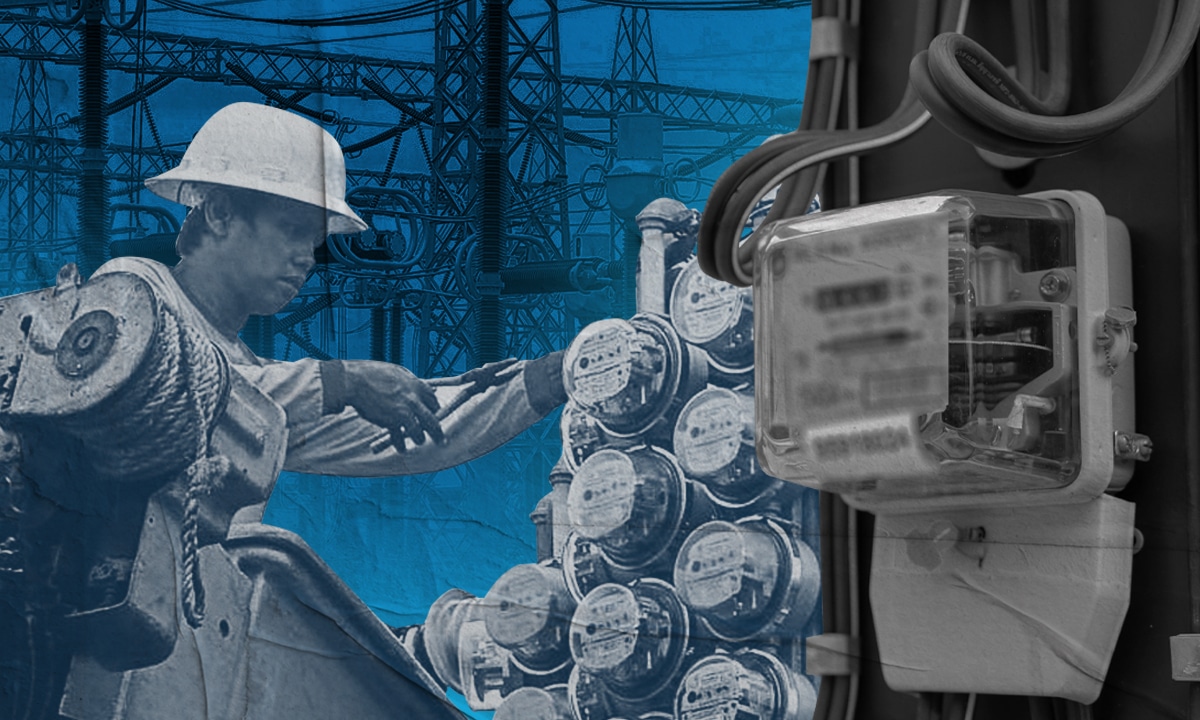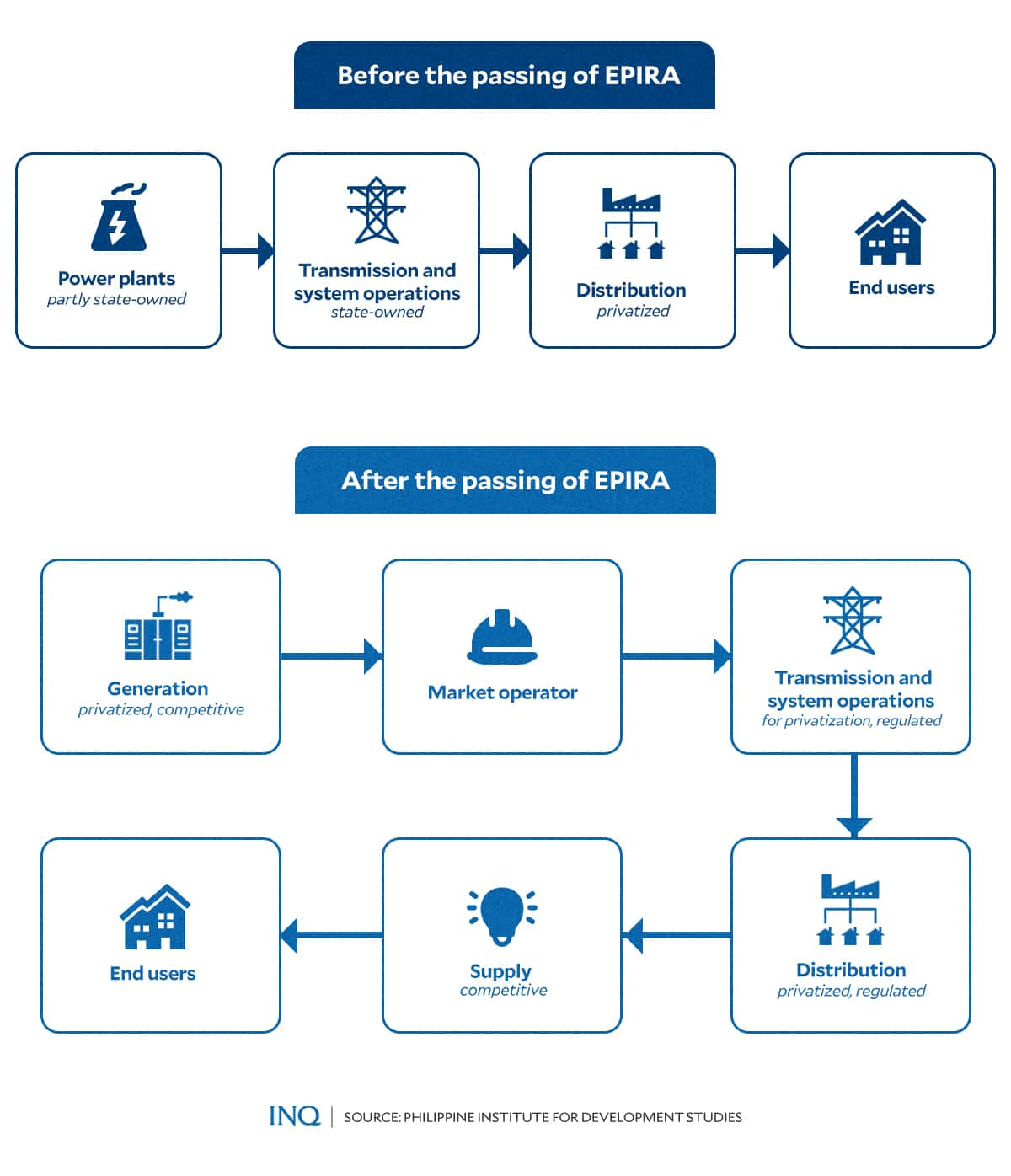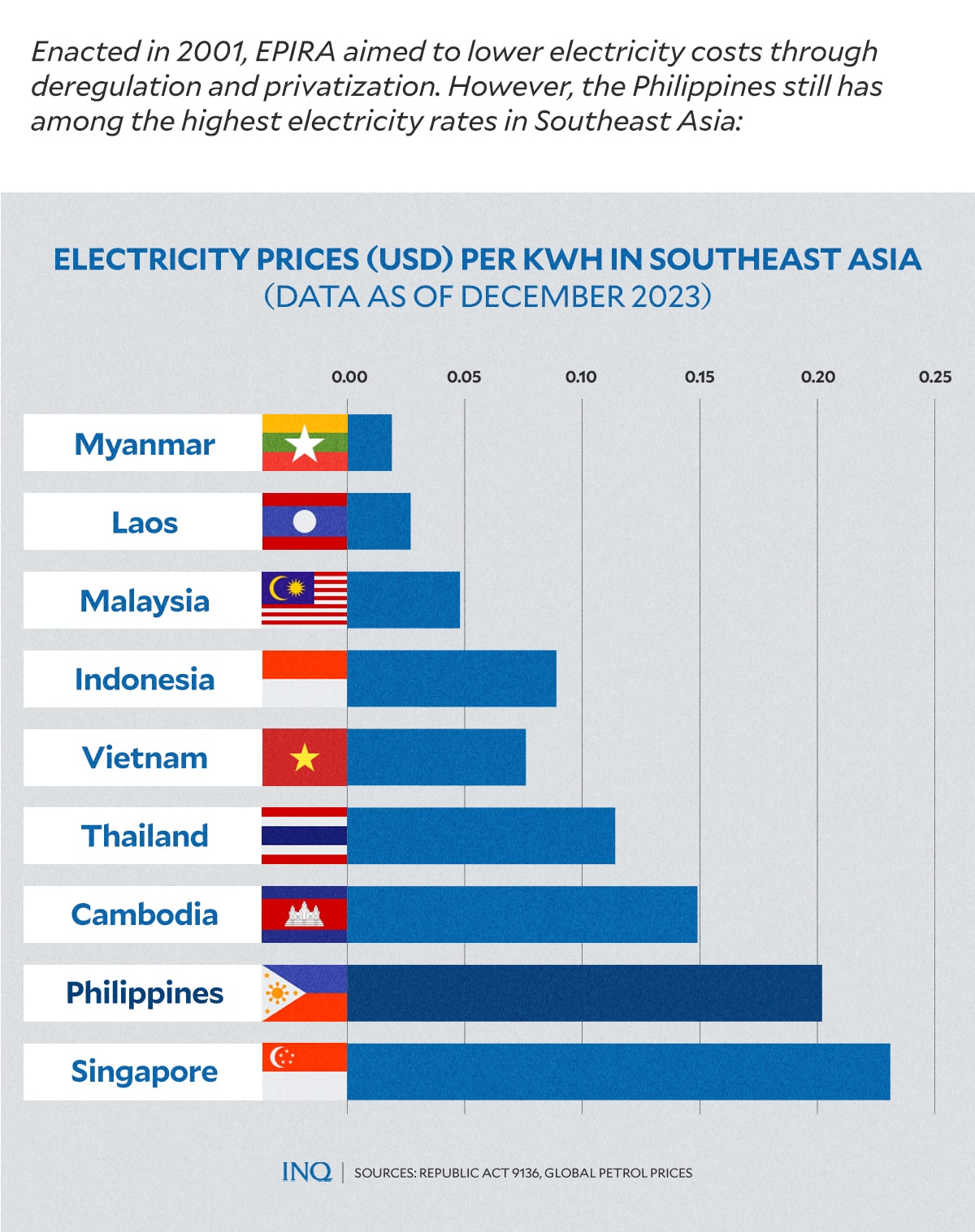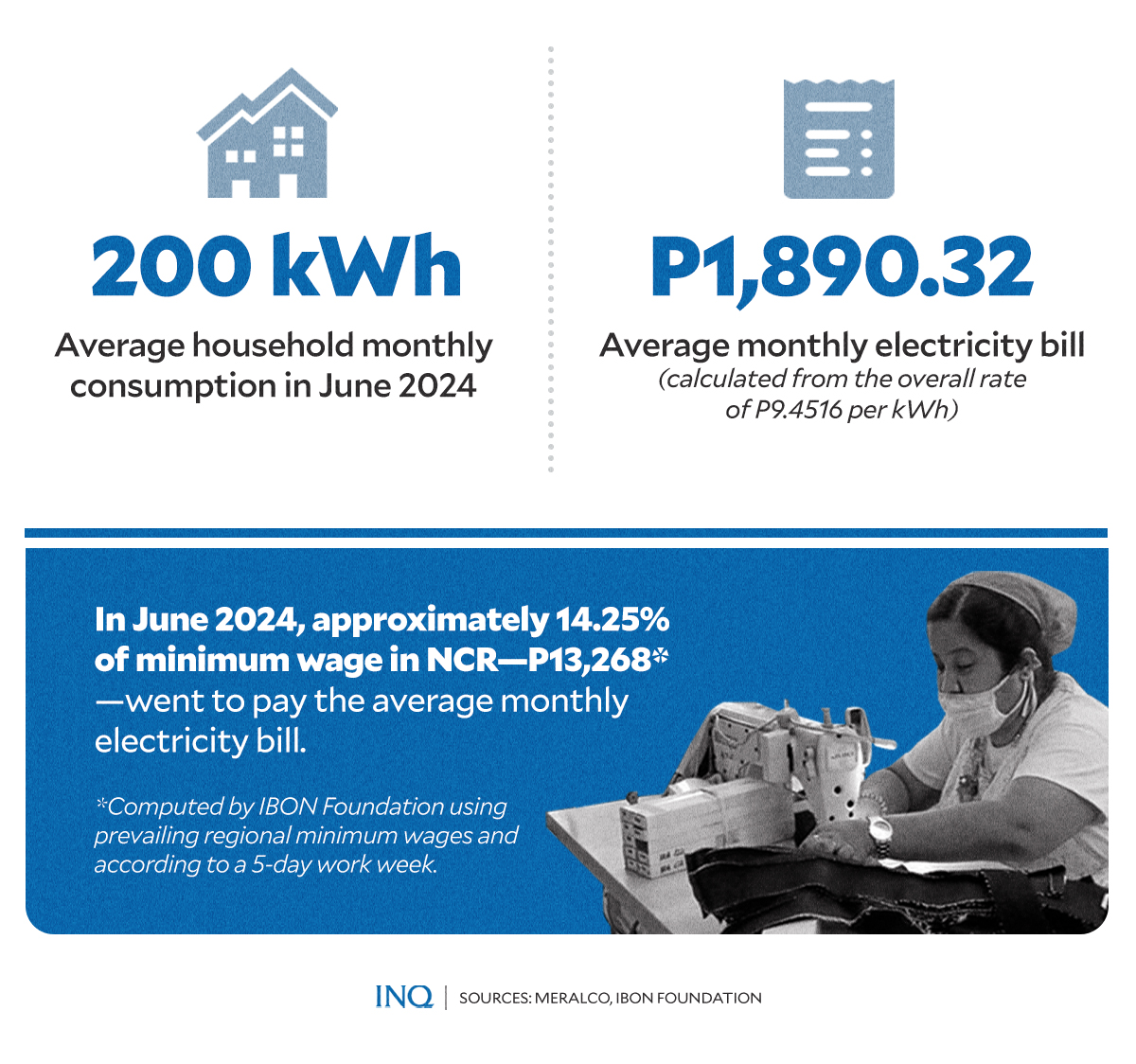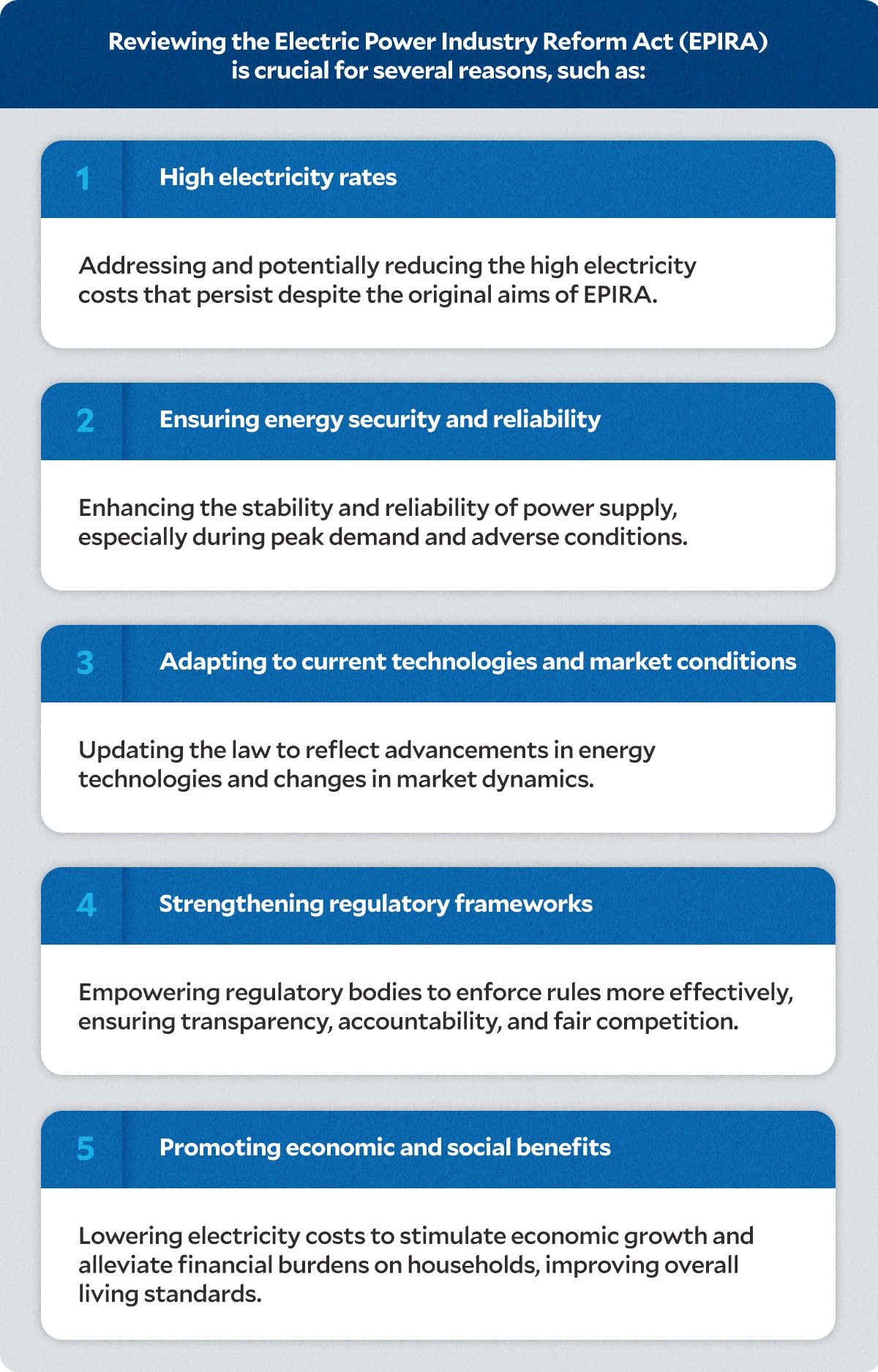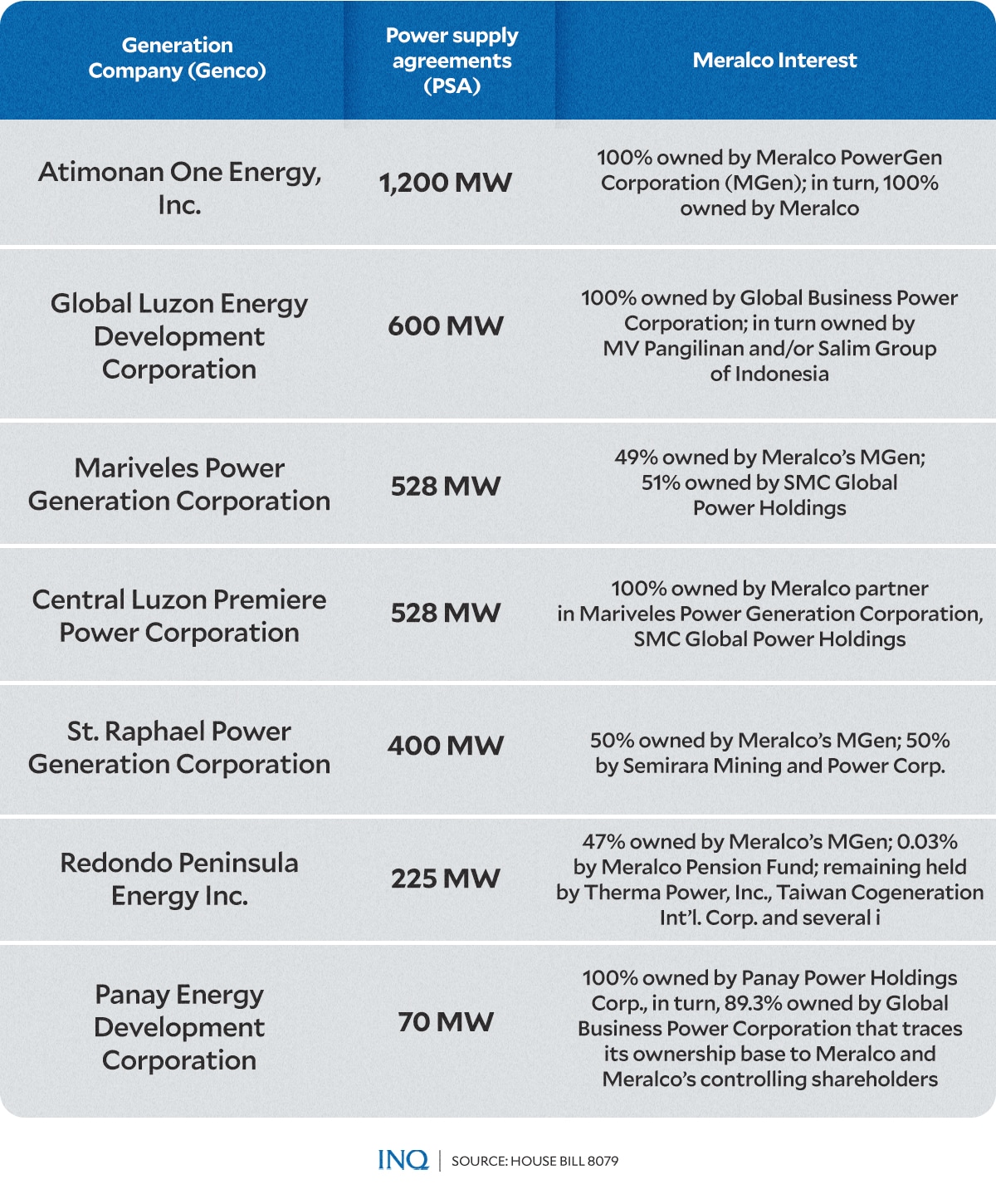Epira review targets: High power rates, cross-ownership
MANILA, Philippines—After months of prolonged power outages and persistently high electricity rates, President Ferdinand Marcos Jr. ordered a review of the Electric Power Industry Reform Act (Epira) last month, 23 years after its enactment.
Last April, an unprecedented heatwave across the country, combined with a deteriorating power supply, led to widespread power outages. Various regions experienced electricity shortages for several hours, days, or even weeks while people contended with record-high temperatures.
During this time, the National Grid Corporation of the Philippines (NGCP) issued yellow alerts across the Luzon and Visayas grids, signaling low reserves that risk power disruptions if conditions worsened. This highlighted the vulnerability of the system during periods of strained energy resources.
READ: Record PH heat drives power supply alerts, bares grid weaknesses
Last May, the situation worsened for the Luzon grid, which faced red and yellow alerts for four consecutive days, indicating severe power deficits that could lead to brownouts. Despite these outages, many consumers saw an increase in their electricity bills in the same month, leading to confusion and frustration over higher costs amid frequent power disruptions.
Article continues after this advertisementREAD: Understanding power rates: Impact of WACC, generation costs
Article continues after this advertisementThe ongoing power supply issues have been a subject of continuous debate among lawmakers and experts since the outages last April. Central to these discussions has been the consideration of Epira and whether it needs to be reviewed to address these persistent supply problems.
Last June 22, during his third State of the Nation Address (SONA), President Marcos urged Congress to determine if amendments to Epira were necessary to resolve power supply issues across the country.
“We are going back and re-examining the Epira to find out if it is still suitable for our current situation or if it is time for it to be amended,” the President said in Filipino.
“I ask the Congress that we work together to consider it for the sake of the Filipinos, at the high price of the country, not only the businessmen are struggling but also the people,” he added.
Restructuring the energy sector
In response to the severe power crisis of the 1990s, characterized by frequent blackouts and high electricity rates, the government enacted Epira in 2001. It aimed to restructure the electric power industry to promote competition, improve efficiency, and ensure a reliable and affordable supply of electricity to all power consumers in the country.
Before Epira’s enactment, the Philippine energy sector was largely state-controlled. Power generation was partly state-owned, while the government fully managed transmission and system operations.
Electricity distribution was, meanwhile, privatized. The energy market was characterized by limited competition, resulting in higher electricity costs and unreliable power supply.
“The reform, which was passed into law through Republic Act No. 9136, restructured the country’s power sector from a vertically integrated state monopoly to a sector that allows competition for some sub-sectors (i.e. generation and retail supply) while recognizing the importance of regulated sub-sectors (transmission and distribution) in ensuring a stable supply of electricity for the entire country,” a discussion paper published by the Philippine Institute of Development Studies (PIDS) explained.
One key provision of Epira includes promoting competition in the generation sector, establishing the Wholesale Electricity Spot Market (WESM) for transparent electricity supply trading, and ensuring the privatization of transmission assets while maintaining government regulation.
The law also defined the role of the Energy Regulatory Commission (ERC) in promoting competition, ensuring consumer protection, and regulating industry practices to maintain fair and transparent operations.
Additionally, Epira mandated measures to ensure a reliable and continuous supply of electricity and required unbundling electricity rates to provide clear and transparent pricing for consumers.
However, due to its perceived ineffectiveness, the law has faced numerous criticisms, with some advocating for its review or outright repeal.
High power rates persist
Despite these reforms following the passage of Epira, high electricity rates persist in the country. As of December 2023, the Philippines had one of the highest electricity rates in Southeast Asia.
Data from Global Petrol Prices showed that electricity prices per kilowatt-hour (kWh) in the Philippines were $0.202 (around P11.65), compared to $0.048 (at least P2.77) in Malaysia and $0.089 (approximately P5.13) in Indonesia. This comparative disadvantage highlights the ongoing issues that Epira aimed to address but has not fully resolved.
In May, following the power outages across the country, Meralco explained that for residential customers consuming 200 kWh, there was an increase of around P92 in their total electricity bill.
The power distribution giant attributed the increase last month to higher generation costs, which went up by P0.4455 per kWh, primarily driven by higher costs from the WESM and PSAs — as well as rising fuel prices and a weaker peso.
Moreover, Meralco explained that the tight power supply played a significant role in the increase in generation charges.
“Charges from WESM went up by P1.7913 per kWh due to tight supply conditions in the Luzon grid during April, as demand increased by 2,401 MW. There were several days with Yellow and Red Alerts, signaling critical power supply levels,” Meralco said.
READ: Lawmakers back Epira review to lower electricity cost
These increases in power rates can place a significant burden on minimum wage earners in the country. According to the IBON Foundation, the minimum wage in the National Capital Region (NCR) in June was approximately P13,268 per month.
In the same month, the average monthly electricity bill for Meralco consumers using 200 kWh was P1,890.32, calculated from the overall rate of P9.4516 per kWh.
This means that around 14.25 percent of a minimum wage earner’s monthly salary in the NCR was spent on paying their electricity bill for that month.
Cross-ownership issues
Over the years, several proposed amendments have been made to the Epira. One of the most notable proposals focuses on addressing cross-ownership in the energy sector. This is the situation in which power distribution utilities also own or have stakes in power generation firms.
Lawmakers and industry experts argue that preventing cross-ownership is crucial for fostering a competitive environment, ensuring fair pricing, and ultimately reducing electricity costs for consumers.
“One major flaw of the Epira is that it allows distribution utilities to own generation companies. The industry uses a seemingly indifferent term for it — cross-ownership,” House Bill (HB) No. 8079 stated.
House Deputy Minority Leader France Castr, of the ACT Teachers party-list, stressed that the ownership of power plants by power distribution utilities guarantees them substantial profits, especially during simultaneous power plant shutdowns.
“What they do is they lower the power supply with forced outages, so the power distribution utility will be forced to buy power at a higher rate in the spot market, resulting in higher power rates which burden the consumers,” Castro said in a statement.
Castro, along with fellow Makabayan members — Representatives Arlene Brosas of Gabriela Women’s Party and Raoul Manuel of Kabataan — authored and filed HB No. 8079 last year. The bill is currently under review by the House committee on energy.
“The logic is simple. Given that the generation cost of electricity is passed on by the distribution utility to the consumers, the higher the generation price, the higher the rates the consumers will pay,” the lawmakers said in the measure’s explanatory note.
“If the distribution utility also owns the generation company, it will be to its financial interest to pay a higher generation cost. In other words, cross-ownership brings about a conflict of interest that the distribution utility will resolve to fatten its pockets rather than lower electricity rates to consumers.”
Last March, Meralco PowerGen Corp. (MGen), Aboitiz Power Corp., and San Miguel Global Power Holdings Corp. (SMGP) were reported to have forged a $3.3-billion (P184.89 billion) agreement to jointly launch the country’s “first and most expansive” liquefied natural gas (LNG) facility.
Castro argued that an enacted HB No. 8079 could have prohibited cross-ownership because the proposal makes it unlawful for energy distribution companies to hold any interest in electricity generation or supply firms.
READ: Makabayan bloc’s HB 8079 could’ve halted merger of power giants – Castro
‘Sweetheart’ PSAs
In an explanatory note, the authors of HB No. 8079 claimed that while the competitive selection process (CSP) is supposed to prevent conflicted distribution utilities from unfairly awarding power supply agreements (PSAs) to their own generation companies, this is not always the case.
They highlighted that CSPs can be manipulated, especially by monopolies. They cited Meralco as an example, noting that it is the largest distribution utility in the country, handling 55 percent of the total electricity output with nearly 7 million customers, demonstrating the significant influence it wields.
Brosas, Castro, and Manuel explained that in April 2016, Meralco signed seven “sweetheart” PSAs amounting to 3,551 megawatts (MW) in contracted capacity, at a time when peak demand stood at 6,748 MW.
“In other words, it contracted more than 50% of its peak demand at that time, breaching the limit allowed by Epira,” they said.
They further pointed out how, aside from disregarding legal limits, Meralco’s partners in the PSAs are generation companies or gencos that were either wholly owned or partly owned by Meralco.
‘Very expensive’ deals
In 2017, the House of Representatives Joint Committees on Energy and Good Government and Public Accountability launched an inquiry into Meralco’s PSAs with its affiliated gencos, dubbed “midnight deals” due to their hasty and substantial nature.
Castro and her fellow Makabayan members detailed that following several exhaustive hearings, the investigation resulted in a recommendation, among others, to:
“[R]eview the Epira with the view of strengthening the policy against cross-ownership, market abuse and anti-competitive behavior in the power industry, including the prohibition on a distribution utility to own or have any beneficial interest in power generation company and limiting gencos in the business of generating and supply of electric power.”
It was also found that the PSAs were costly, with prices significantly higher than declared by Meralco, resulting in substantial charges to consumers.
“The seven PSAs average price of P5.12 per kWh was found to be P1.45 per kWh higher, translating to more pass-on charges to consumers in the amount of P159.3 billion a year or P3.19 trillion in 20 years,” HB No. 8079 stated.
The Supreme Court later ruled that Meralco and ERC had failed to fulfill their obligations, emphasizing the need for transparent competitive bidding. Subsequent CSPs by Meralco likewise faced allegations of bid rigging, further highlighting issues of anti-competitive behavior.
“This pattern of anti-competitive behavior and abuse of monopoly power that Meralco has consistently displayed begs the prohibition of cross-ownership in the distribution sector and the rest of the industry,” the House bill authors stressed.
“The retail competition and open access and the competitive selection process mechanisms are not enough to protect the consumers from Meralco’s shameless self-dealing,” they added.
Meralco denies accusations
Meralco has long been under scrutiny due to allegations of cross-ownership and anti-competitive behavior. Over the years, lawmakers have repeatedly raised concerns about these issues.
However, Meralco has consistently defended itself against these accusations, asserting its compliance with regulatory standards and commitment to fair competition in the power sector.
Last November, in response to a privilege speech by Santa Rosa Rep. Dan Fernandez, which accused Meralco of anti-competitive behavior, among other issues, Meralco promptly issued a statement defending its practices.
In a statement, Meralco explained that not only does it comply fully with all government regulations but also exceeds the required service standards set by the regulator. It added that due to this, some local government units are actively seeking Meralco to take over their service areas.
“Further, while Meralco is the largest utility in the country, it has never committed and has no record of any anti-competitive behavior or abuse of market power,” said Meralco spokesperson Joe Zaladarriaga.
“On the contrary, we have always managed to supply electricity to our customers in the most transparent and least cost manner, and is the only distribution utility that has complied with an ERC directive to refund distribution charges by refunding more than 48 billion pesos in 2023,” he added.
READ: Meralco denies being monopolistic, keeping capital cost high
Meralco also refuted the lawmakers’ accusation of overcharging customers since 2012.
The company cited a study by the International Energy Consultants, which concluded that Meralco’s rates are “fair and reasonable” as they accurately reflect the true cost of electricity. In contrast, the study noted that power costs in many other countries are significantly subsidized by their governments.
“This was the result of the company’s constant efforts to source the least cost available supply through, among others, the conduct of a transparent, competitive selection process (CSP),” Meralco said.
Prior to the conduct of CSP, Meralco said that it needed to get approval from the Department of Energy (DOE) for its Power Supply Procurement Plan and the Terms of Reference (TOR) “to make sure that these are aligned with the requirements and standards set by the government.”
“This is contrary to the baseless and malicious claims that Meralco’s TOR is tailor-fitted to favor select generation companies,” said Meralco First Vice President Jose Ronald Valles.
“Our past CSPs conducted are proof that no such tailor-fitting is happening, precisely because the TOR and other bidding documents are required to comply with existing policies of DOE and regulations of ERC, and the resulting Power Supply Agreement needs to be approved by regulator,” he added.
‘Customization’ of bidding rules
Last year’s clash between lawmakers and Meralco was not the first time accusations of processes being tailored to favor certain generation companies have come under scrutiny.
In 2021, then Bayan Muna Rep. Carlos Zarate pushed for a ban on cross-ownership of distribution utilities and power generation companies “to stop the anti-consumer self-dealing transactions” among these firms.
In a statement, Zarate slammed Meralco’s continued attempts to customize the terms for the upcoming bidding of power supply needs in favor of its subsidiary Atimonan One Energy Inc.
“The Department of Energy’s (DOE) competitive selection process (CSP), which supposedly provides rules to protect consumers during power supply auctions, is proving useless in stopping the dubious customization of Meralco’s power supply bidding rules,” he said.
A 2015 DOE circular, which originally launched the CSP, stated that a “third party recognized by the DOE shall supervise the bidding process under the CSP policy.”
Zarate said that in 2018, the DOE released a new CSP circular, wherein the requirement for a third-party auctioneer has become optional, not mandatory.
“Instead of an independent third-party auctioneer, the 2018 DOE allowed the DU to create a DU-controlled third-party bids and awards committee (TPBAC) tasked to supervise the bidding. Meralco has taken advantage of this change in CSP rules to create a Meralco-controlled TPBAC. Expectedly, the TPBAC is customizing the terms for holding an auction that favors Atimonan One,” Zarate added.
“Only a ban on cross-ownership can now save Meralco customers from higher rates that Atimonan One will submit—and Meralco will surely accept—during the sham Meralco bidding in January 2021,” he added.
In 2019 Zarate, and Bayan Muna Chairman Neri Colmenares already called out Meralco to exclude its gencos from bidding for PSAs to assure consumers that they get the least cost of electricity from power suppliers.
However, Meralco defended the right to include its own gencos subsidiaries and affiliates, stressing there is no law against it.
“There is no prohibition in the law, the DOE guidelines and even in the SC decision that prevent affiliate generation companies from participating in the bidding for power supply requirements of distribution companies,” Zaldarriaga previously said.
Zarate answered by pointing out that a House investigation found that Meralco awarded without bidding to its own affiliated gencos power supply contracts containing P900 billion in overpriced power rates that Meralco would pay to itself through its affiliated gencos.
“The House investigation caught Meralco with its hands in the cookie jar, yet Meralco is feigning innocence about it,” Zarate noted.
“Meralco tried to award the PSAs without bidding under rules of the CSP, which should have required the company to get at least two offers before awarding a PSA.”
That same year, according to HB No. 8079, Meralco conducted CSP for its power supply requirements. Out of these, two CSPs were successful, resulting in several gencos winning bids for a total of 1700 MW of Meralco’s power supply needs.
However, one CSP was marred by suspicions of bid rigging, particularly involving Meralco’s nullified 1200 MW deal with its subsidiary, MGen’s Atimonan One Energy. The bidding terms for this CSP were allegedly so skewed in favor of Atimonan that no other genco found it worthwhile to participate.
READ: Bayan Muna: Meralco’s defense of self-dealing confirms anti-competitive practices
In late 2020, Meralco initiated another CSP for 1800 MW of power supply, which was needed starting in 2024. This process again faced scrutiny, with the terms of reference being questioned for seemingly favoring Atimonan.
The following year, in 2021, Lawrence Fernandez, Meralco vice president and head of utility economics department, clarified that the bidding in 2019 was a “successful endeavor” done in compliance with the DOE order requiring distributors to procure power through fair bidding.
READ: Meralco gives assurance lowest electricity cost is its objective, too
The CSP, he said, was “administered” by a third-party bids and awards committee that was formed in accordance with the DOE order.
RELATED STORIES:
Consumer groups, firms back call for Epira review
Pia Cayetano calls for complete review of ‘Epira’ law amid outages, costly electricity
